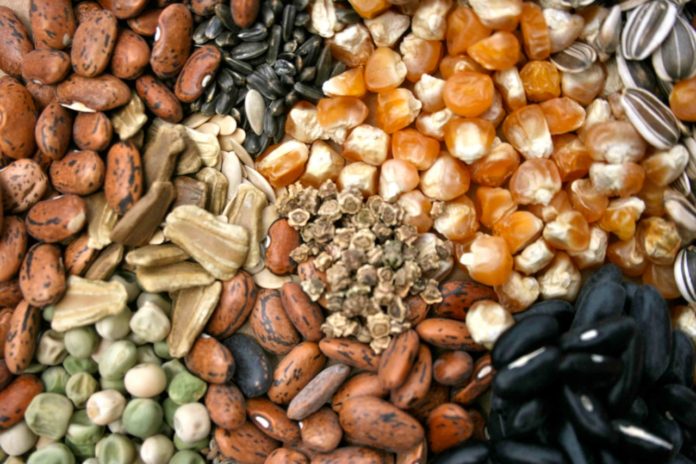Agriculture is a major employability contributing to about 33 percent of the total working force in Ghana. In tackling food security and unemployment intricacies, seeds are the critical element to deal with in the agricultural sector.
As a means of solving this issue, the department of horticulture at the Faculty of Agriculture, KNUST has organized a maiden edition of SEED SECTOR FORUM with the theme; Taking Advantage of Advances, Entrepreneurship and Business Opportunities in the Modern Seed Sector at the NBC-ground floor, KNUST.
West Africa’s contribution in the seed sector to African agriculture especially Ghana is marginal, but there is still room for improvement. The improvement would come from the youth, therefore it is a challenge to those in the seed science and agribusiness in general, to take advantage of the opportunities available in the seed sector. The Chairman for the forum, Prof. Enoch A. Osekre the Dean of Faculty of Agriculture, KNUST made this statement during the forum.
“You do not need to be a breeder to be in the seed industry, in the demonstration, there are some companies who are just providing services like packaging, marketing, so we need to take this challenge but it should not be a case whereby when we graduate we complain there are no jobs”, Prof. Osekre admonished the students.
According to Prof. Osekre, Africa has the opportunity to show the world that it can produce everything and it begins with the youth. He believes the youth have been equipped with all the skills and the knowledge needed to transform the sector.
In addition, the Regional Agriculture Director in the Ashanti Region, Rev. John Manu said the government is much concerned about the youth thus the programme, Youth In Agriculture.
The government has put some mechanisms in place for the youth who want to venture into agriculture. Under the Planting for Food and Jobs programme he said, there is a scheme called the Out-grower Scheme that gives preferential treatment to the cluster of youth in terms of inputs subsidies for production.
The Ghana Youth Authority in collaboration with the Ministry of Agriculture is instituting a programme to support the youth in the agriculture sector.
Furthermore, the passing of the Plant Breeders Bills has given Ghanaian scientists or the breeders the protection of their intellectual work in breeding more variety of seeds to the agriculture sector. “As far as the Plant Breeders Bill is passed all the focus should be channeled to support our scientists so that we can make good use of the resources that we have”, Rev. John Manu reiterated.
The seed industry in Eastern and Southern Africa is more developed compared to West Africa and crop yields especially maize are relatively low in West and Central Africa, the West African Director of Seed Co, Dr. Takemore Chagomoka complained.
As agriculture is the backbone of most economies in sub-Saharan Africa he said, the seed is an important catalyst for the development of agriculture.
In Seed Co’s contribution to the development of students in agriculture, Seed Co in partnership with Agrihouse Foundation is rolling out a programme called AG-STUD Africa Bootcamp which aims at training agriculture graduates in Ghana by building the students’ capacity on good agricultural practices.
“Seed Co is poised in working with both the government and the stakeholders in the agriculture value chain to develop the youth interest in the agriculture sector”, Dr. Chagomoka said.
“Students and the youth are the future of agriculture so the forum was organized to target the students to develop their interest and making them realized that there are business opportunities and job creation opportunities they can take advantage of in the seed sector and agriculture sector in general”, Dr. Eli Gaveh, Senior Lecturer at the Department of Horticulture, KNUST said.
In his presentation, Dr. Gaveh said there are many opportunities in the seed sector for the students. Giving instances to some of the opportunities in the seed sector Dr. said companies like De Bolster, Incotec, and Enza Zaden breed seeds, integrate seeds, and coat seeds.
De Bolster is a Dutch company that specializes in breeding organic seeds and it aims at moving organic agriculture forward by offering the best organic varieties whilst Incotec, seed enhancing company creates and delivers sustainable added value to seeds to support the increasing need for healthy food and to make the contribution to the welfare of the world, and lastly, Enza Zaden is an international seed breeding company that develops innovative vegetable variety seeds for professional grower and focus on continuity in the long term and healthy growth.
He underscored the need for the government and the policymakers to see the seed sector as a key driver of agriculture and focus on developing the germplasm by developing the Greta Seed, foundation seeds, and the certified seeds.
“We have to graft strong policy implementation, we have a lot of policies but the implementation of the policies is limited. Although the government is doing a lot with the Planting for Food and Jobs policies, there are a lot of opportunities the government can explore to make agriculture more relevant, and significant to economic growth and development and to make the country self-sufficient in food production”, Dr. Gaveh highlighted.
Speaking to some of the students at the forum, Leonora, a level 300 student told Agric Today that the forum has given her more insight into the horticulture sector.
“I have noticed there is more to agriculture than farming. Today’s forum has been insightful knowing I could be a seed breeder, seed coating technologist and among others”, she gladly said.
She thanked the organizers for the programme and requested similar programmes to be organized for the final year students to equip and inform their decisions in the agricultural space.








